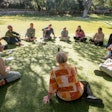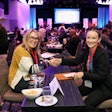It’s easy to be in awe of the attendees at Elevate, the inaugural Association for Women in Events conference. Many at Mandarin Oriental, Washington, D.C., are among the industry’s brightest and most-driven stars.
AWE’s hope is to inspire and promote its members to leadership positions. The fact remains that while women comprise the bulk of the events industry’s planners, a glass ceiling—however cracked—remains atop the ladder. “Make yourself indispensable,” advised Sarah Hurwitz, a former White House speechwriter who was Elevate’s opening keynote on March 7.
Her tip to up-and-comers is sound, but it raises the question whether men have as much work to do to prove their worth. Here are some takeaways from a rare male in the Elevate audience, albeit one with a staff comprised primarily of young, talented women.
Communication Is Key
How do you assume leadership?—By conveying key information at the right time. Hurwitz tackled the public speaking element while Kelsey Dixon, co-founder of the marketing firm, Davies + Dixon, tackled crisis communication. Both are equally important elements as planners create events to increase brand awareness, build better teamwork or launch a new product. Hurwitz emphasized a natural approach, noting the ability to demonstrate themes in concrete terms will win over an audience. She would know, having written thousands of speeches for Michelle Obama. In that role, Hurwitz collaborated with the former first lady to maintain messages in a way Obama would say them. The results were often clear, inspiring speeches. Dixon’s talk on crisis communications spoke to a dark secret in the industry: Many event organizers don’t plan for the worst-case scenario. Her firm’s job is to think ahead to be ready for when something goes off-script—whether a vendor at a vegan event serves milk-covered almonds or there’s a fire in or near an event’s venue (and many more examples). Being prepared allows for measured, effective responses that at worst minimize the damage, and at best, put organizations in the position to stay stop attendees’ concerns.
Each Path Is Different
Raise your hand if this is the career you’ve chosen. Tahira Endean, CMP, DES, CED, SITE’s new head of events, wouldn’t have been able to do so even if she wanted to a young age. Endean was sure she was going to be a hair dresser, until a medical condition left her unable to hold her arms above her waist. Decades later, Endean is now recovered (thankfully) but that’s only of the circuitous routes that led her to SITE. Leaving her job and traveling the world—sounds like a dream!—ended up placing her at the right place and the right time. The point is not to emulate how Endean landed a dream position, but rather to demonstrate that career setbacks ultimately lead to better opportunities.
Support the Community
Women need to stick up for one another. Especially in difficult times, one peer can help provide emotional support to discuss difficult subjects. Examples A and B are Courtney Stanley and Sarah Soliman Daudin have shared similar challenges and come together to become leaders of the #MeetingsToo movement, shedding light on dark subjects light harassment. Together, they have made each other strong and done the heavy lifting for the industry to say inappropriate behavior should not be tolerated and developed action points to limit harassment. It’s also important to note that they seek out men’s input in these public forums and cringe that men are often hesitant to hug their women counterparts in appropriate moments. Stanley and Daudin are not stopping at Elevate. The next day, they launched SarahxCourntney, a professional development program including one-on-one mentorship for women in business. *Photo courtesy of EPNAC















